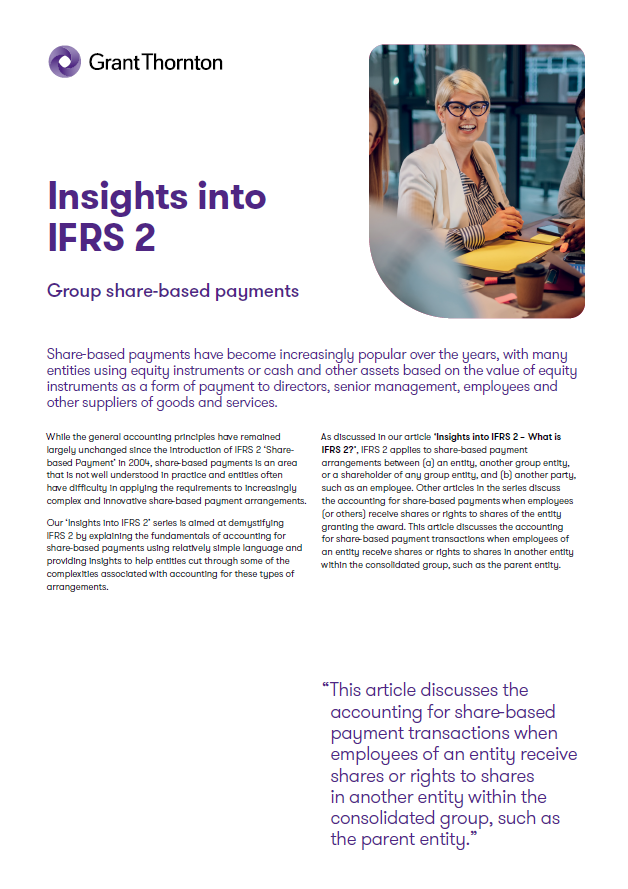-
Compliance
Assistance in the design, implementation and monitoring of Compliance programs within the framework of local and international regulations (FCPA, Corporate Criminal Responsibility Law), including course delivery.
-
Forensic
The services offer includes expert advice in litigation resolution and the development of procedures in legal/digital forensics and cybersecurity.
-
Human Capital solutions
Grant Thornton's Human Capital division has a team of professionals determined to accompany individuals and organizations throughout the relationship between the employee and the organization.
-
Organizational restructuring
Advice on operational restructuring to companies in difficulty, their creditors or other interested parties.
-
Services to the Government and the Public Sector
Financial audit projects and special technical and concurrent reviews of programs of national and subnational governments financed by International Credit Organizations. Special projects for government entities, public and mixed companies.
-
Sustainability
Learn how our sustainability services can help you go beyond and build a strong reputation, attract committed investors and generate long-term sustainable financial results.
-
Transaction Advisory Services
The service offer includes financial due Diligence, operations services, business and strategic intelligence, ratings, advice on mergers and acquisitions, capital markets and debt advice.
-
Valuation Services
We provide stock, business, asset, and liability valuations in support of negotiations, account structuring, and tax opportunities.
-
Academy - Empowered by Grant Thornton Argentina & Perú
Academy is an e-learning platform that emerged as a joint initiative of Grant Thornton Argentina and Grant Thornton Perú. It is designed so that everyone can acquire new skills in accounting, auditing, taxes, technology and business through access to multiple courses and certifications.
-
Audit methodology and technology
At Grant Thornton we use a single audit methodology across our global network. We apply it through LEAP, an integrated software audit tool. Get to know it now.
-
External audit
We offer services of external audit of financial statements, assurance reports, agreed-upon procedures reports and certifications, due-diligence and take-over of companies.
-
Prevention of money laundering and financing of terrorism
At Grant Thornton we provide advice to our clients in the development of an Asset Laundering and Terrorist Financing Prevention strategy that allows them to prevent risks in a comprehensive manner.
-
Professional standards and training
Our IFRS advisors can help you navigate the complexity of the standards so you can spend your time and effort on your business.
-
Accounting, administration and finance services
Effective accounting and financial advisory are necessary for the success of an innovative and forward-thinking organization. We provide our knowledge and experience so you can stay focused on your business's core activities.
-
Payroll
We have the experience and the know-how to perform payroll for various industries, including those in which trade unions and workers' organisations are active.
-
Start-up of companies
The early stages of a business are key to its success. Therefore, it's important to have experts who manage and administer business resources. Learn about our solutions to help you build your company.
-
Tax outsourcing
Taxes have a significant impact on business decisions. At Grant Thornton, we respond quickly and design tailored solutions to ensure organizations are not adversely affected.
-
FIU Independent External Reviewer - AML/CFT
We participate in the implementation of the requirements of the FIU in leading companies and our services ensure an orderly framework, optimizing the investment.
-
Cybersecurity
As sophisticated digital manipulations become more prevalent, organizations must strengthen their defences and effectively protect themselves from threats and recognize those that are not. Organizations must act quickly to strengthen trust and resilience. A combination of enhanced security capabilities, robust controls, and employee education and awareness is critical.
-
ITGC Controls
Information Technology General Controls (ITGC) are a set of policies that ensure the effective implementation of control systems throughout an organization. ITGC audits help verify that these general controls are implemented and functioning correctly, so that risk is appropriately managed.
-
Creation and acquisition of Financial Entities
We have the knowledge and experience in activities related to the acquisition and creation of financial entities, both locally and internationally.
-
Financial statements audit
We offer services of external audit of financial statements; assurance reports, agreed procedures and certifications; due-diligence and take-over of companies.
-
Internal audit
An internal audit helps identify gaps, deficiencies, and potential for inherent risk in all facets of the organization.
-
IT Internal Audit
IT has been, and will increasingly be, a key factor for success and operational efficiency in all industries. Innovations such as the cloud and virtualization, and new threats around data security, have reinforced the importance and increased the risks associated with the use of technology for our clients.
-
Legal audit
The monitoring of the legal area is usually a complex and difficult task for organizations, which however cannot be neglected.
-
Responsible for regulatory compliance
At Grant Thornton we offer the service of acting as "Responsible for Regulatory Compliance and Internal Control" for companies that requested registration as Settlement and Clearing Agent and Trading Agent.
-
SOC 1, SOC 2 and SOC 3 Reports
At Grant Thornton, we support our clients in obtaining SOC 1, SOC 2 and SOC 3 reports, enabling them to provide assurance to their clients and partners regarding the design, implementation and operation of adequate internal controls, highlighting the organisation’s commitment to the highest standards of control and security.
-
Services to private clients
Wherever you are in the world, our tax specialists can help you with your interests and investments abroad.
-
Global Mobility Services
Sending someone abroad involves liabilities and obligations. We offer interesting solutions to minimize the tax burden for both parties.
-
Direct Tax
We provide clear and practical solutions that meet your specific business needs, in the most tax-efficient way possible.
-
Indirect Tax
Grant Thornton's tax teams take a rigorous approach to help you meeting your tax obligations, whatever challenges you may face along the way.
-
International taxes – Transaction support
We offer our international experience in the field and make available the resources to plan and adequately comply with regulatory frameworks.
-
LATAM Tax Newsletter
Stay informed with the latest tax developments across Latin America with the LATAM Tax Newsletter, prepared by our experts throughout the Americas.
-
Clean energy and technology
Growing demand, development of new ways of energy and a need for a sustainable future: we support our clients in these changes to be one step beyond their competitors.
-
Mining
Our flexible, partner-led teams are dynamic and focused on development. We take time to understand the details of the client’s business and offer unique solutions.
-
Oil and gas
Our Oil & Gas teams have the deep knowledge, wide experience and vision needed to offer our clients practical solutions adapted to their businesses.
-
Banking
Grant Thornton offers meaningful and accurate solutions for operational and transactional issues, litigation and administrative disputes in banking.
-
Private capital
We gather international teams of experts in corporate finance, restructuring and recovery, tax and insurance services to deliver customized solutions from initial investment, through development stages until the end of each project.
-
Fintech
We work to take advantage of all opportunities and manage industry risks, allowing our clients to always be one step beyond their competitors.
-
Asset management
We have specialized teams in more than 140 markets delivering solutions regarding insurance, taxes and advisory to global, international, regional, local asset managers.
-
Insurance
Thanks to our specialized team we offer accurate solutions for operational and transactional matters, litigations and administrative conflicts.


Group share-based payments
Download this article for the full insights into accounting for group share-based payment arrangements.
This article discusses the accounting for share-based payment transactions when employees of an entity receive shares or rights to shares in another entity within the consolidated group, such as the parent entity.
Group share-based payment arrangements
Share-based payment arrangements are commonly agreements between an entity and its employees, where the employees receive either (1) the entity’s own equity instruments or (2) payments based on the share price of the entity’s own equity instruments. However, in some cases, share-based payment arrangements may involve another group entity or a shareholder of any group entity.
For example, a share-based payment arrangement may be entered into with the employees of one entity, but another group entity or shareholder of another group entity is responsible for settling the obligation associated with the share-based payment transaction. In other words, the entity receiving the services from the employee is not always the entity that is responsible for settling the share-based payment transaction.
To determine whether an agreement represents a group share-based payment arrangement that is within the scope of IFRS 2, it is also important to understand what a ‘group’ is and which entities or parties should be considered. IFRS 2 refers to the guidance in IFRS 10 ‘Consolidated financial statements’.
This definition is determined from the perspective of the reporting entity’s ultimate parent. For example, in the organisational structure shown below in Figure 1, the group includes the ultimate parent (UP), and all of its subsidiaries. In Figure 1, the following are two examples of share-based payment arrangements that would fall under the scope of IFRS 2:
- Example 1: UP grants a share-based payment award, to be settled in its own equity instruments, to the employees of Subsidiary C (SC).
- Example 2: Subsidiary A (SA) grants a share-based payment award to its employees, that will be settled in the equity instruments of Subsidiary X (SX).

When determining whether a transaction is within the scope of IFRS 2, it is also necessary to consider the financial statements in which the share-based payment transaction is being recorded.
In other words, is the arrangement being assessed from the perspective of the consolidated financial statements of the entire group, or is the arrangement being assessed from the perspective of the separate financial statements of one entity involved in the group share-based payment transaction?
In Figure 1 above, both examples are share-based payment transactions that would be recognised in the consolidated financial statements of UP, because the consolidated entity is receiving services and settling the transaction in its own equity instruments. In addition:
- Example 1: The transaction between UP and SC is a group share-based payment that would also be recognised in the separate financial statements of both UP and SC, because the settling and receiving entity are in the same group.
- Example 2: The transaction between SX and SA is a group share-based payment that would also be recognised in the separate financial statements of both SX and SA, because they are entities in the same group (from the perspective of the UP).
How is a group share-based payment arrangement accounted for?
To determine the appropriate accounting treatment, share-based payment transactions must be classified as either an equity-settled transaction or a cash-settled transaction. The classification of group share-based payment transactions requires an entity to assess:
(a) the nature of the awards granted, and
(b) its own rights and obligations.
The classification depends on whether the assessment is made from the perspective of the group entity receiving the goods or services or the group entity settling the share-based payment transaction. This is an important concept when it comes to dealing with group share-based payments as the amount recognised by the entity receiving the goods or services may differ from the amount recognised by the consolidated group or by another group entity settling the share-based payment transaction.
Receiving entity
The entity receiving the goods or services (the receiving entity) measures the goods or services received as an equity-settled share-based payment transaction when:
(a) the awards granted are its own equity instruments, or
(b) the entity has no obligation to settle the share-based payment transaction.
In all other circumstances, the receiving entity measures the goods or services received as a cash-settled share-based payment transaction. For example, if a subsidiary grants a share-based payment award to its employees that will be settled in the equity of its parent, and the subsidiary is responsible for settling the award, then the subsidiary will classify the transaction as cash-settled because (a) it is obligated to settle the award and (b) the award will not be settled in the subsidiary’s own equity but in the equity of its parent.
All of the terms and conditions of an arrangement must be considered when determining its classification. For example, a grant of shares that are redeemable either mandatorily or at the employee’s option is a cash-settled share-based payment arrangement because the entity may be obligated to ultimately settle in cash.
Another scenario is where an entity, at the time of granting an award to be settled in its own equity instruments to its employees, simultaneously issues those employees put options to sell the shares back to the entity (ie as a liquidity option for the employees). The existence of a cash alternative affects the classification of such arrangements.
Settling entity
The entity settling a share-based payment transaction when another entity in the group receives the goods or services (the settling entity) recognises the transaction as an equity-settled share-based payment transaction only if it is settled in the entity’s own equity instruments. Otherwise, the transaction should be recognised as a cash-settled share-based payment transaction.
Once the group share-based payment transactions are classified as either equity-settled or cash-settled transactions, the accounting follows the methods described in our article, ‘Insights into IFRS 2 – Equity-settled share-based payment arrangements with employees'i and our upcoming article, 'Insights into IFRS 2 - Cash-settled share-based payment arrangements with employees.'
How does an entity account for intragroup repayment arrangements?
Some group transactions include repayment arrangements in which one group entity is required to pay another group entity for providing share-based payments to its employees. For example, a parent company may charge a subsidiary for the equity instruments or cash that it provided to the subsidiary’s employees. In these situations, the receiving entity accounts for the share-based payment transaction in accordance with the guidance discussed above, regardless of whether an intragroup repayment arrangement exists.
In other words, the receiving entity should classify the transaction as equity-settled or cash-settled without considering the intragroup repayment arrangement. In the previous example, the existence of an intragroup repayment arrangement requiring a subsidiary to reimburse its parent for the cost of granting the awards does not mean – for the purpose of classifying the group share-based payment arrangement – that the subsidiary has the obligation to settle the award to its employees.
IFRS 2 does not address the accounting treatment for intragroup repayment arrangements. In our view, the entities should first assess whether the repayment arrangement is directly related to the share-based payment. For example, entities may consider repayment arrangements where the amount of the repayment is based on the value of the share-based payment (eg repayment is based on the grant-date fair value of an equity-based share-based payment) to be directly related. This assessment will depend on facts and circumstances and may vary by arrangement and jurisdiction.
When repayment arrangements are not directly related to the share-based payment, our view is that it is more appropriate for the subsidiary to recognise an expense for the repayment arrangement (note that this would result in a debit to expense in the subsidiary for both the IFRS 2 share-based payment expense and the repayment).
In contrast, our view is that repayment arrangements that are directly related to the share-based payment should be accounted for in the separate financial statements (ie parent and subsidiary in the above example) as an adjustment to the capital contribution recognised from the share-based payment.
When the repayment arrangement is directly related to the share-based payment and the intragroup repayment charge exceeds the capital contribution recognised in respect of the share-based payment, the entity should develop an accounting policy to account for the excess. Some approaches observed in practice are as follows:
Parent’s separate financial statements:
- The excess is credited to the income statement of the parent as dividend income, or
- The excess is credited against the investment in the subsidiary (ie applies even if the repayment amount exceeds the capital contribution(s) previously debited to the investment in the subsidiary for the share-based payment).
Subsidiary’s separate financial statements:
- The excess is expensed (ie the full amount of the repayment arrangement is expensed, in addition to the expense related to the share-based payment), or
- The excess is debited to reduce other equity.
How does an entity account for transfers of employees between group entities?
When a share-based payment arrangement has a service condition that references a group rather than a particular entity, employees may sometimes transfer between different entities in the group during the vesting period. For example, a parent may grant an award to an employee of one of its subsidiaries that is subject to remaining employed by the group for a specified period. As a result, the employee may transfer employment from one subsidiary to another without affecting the service condition.
As discussed previously, if the subsidiaries have no obligation to settle the transaction, then the arrangement is classified as an equity-settled transaction. Each subsidiary will measure the services received by the employee at the grant date fair value of the award, for the portion of the vesting period that the employee served with each subsidiary.
If the subsidiaries have an obligation to settle the transaction in the parent’s equity instruments, then the arrangement is classified as a cash-settled transaction. Each subsidiary measures the services received by the employee at the grant date fair value of the award for the portion of the vesting period that the employee was employed by that subsidiary, and recognises any change in fair value of the award during the employee’s service period with each subsidiary.
If an employee that has transferred between group entities fails to meet a vesting condition other than a market condition (eg the employee leaves the group before completing the service condition), each subsidiary adjusts the amount previously recognised in accordance with the principles discussed in our article ‘Insights into IFRS 2 - Equity-settled share-based payment arrangements with employees.’ ii This is because the vesting condition is service to the group.
How we can help
We hope you find the information in this article helpful in giving you some insight into IFRS 2. If you have a complex scenario or you would like to discuss any of the points raised, please contact us.
i and ii. Equity-settled share-based payment arrangements with employees (www.grantthornton.com.ar)





